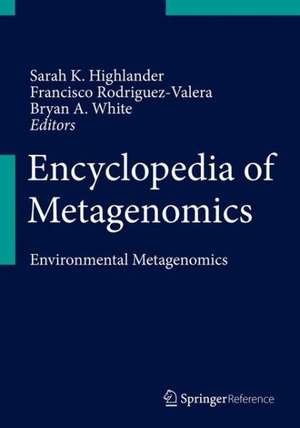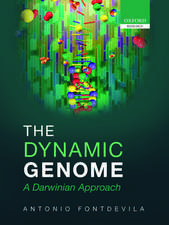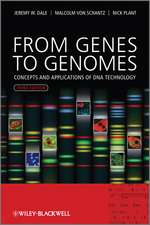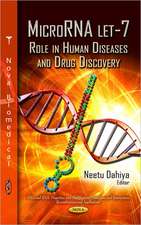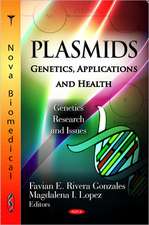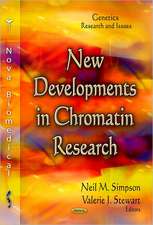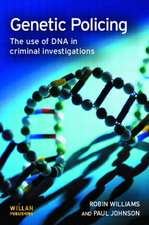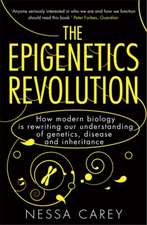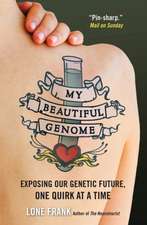Encyclopedia of Metagenomics: Environmental Metagenomics
Editat de Sarah K. Highlander, Francisco Rodriguez-Valera, Bryan A. Whiteen Limba Engleză Hardback – 2 ian 2015
Preț: 1855.11 lei
Preț vechi: 2262.33 lei
-18% Nou
Puncte Express: 2783
Preț estimativ în valută:
355.02€ • 369.28$ • 293.09£
355.02€ • 369.28$ • 293.09£
Carte tipărită la comandă
Livrare economică 14-28 aprilie
Preluare comenzi: 021 569.72.76
Specificații
ISBN-13: 9781489974747
ISBN-10: 1489974741
Pagini: 776
Ilustrații: XXVII, 747 p. 163 illus., 122 illus. in color.
Dimensiuni: 178 x 254 x 47 mm
Greutate: 1.55 kg
Ediția:2015
Editura: Springer Us
Colecția Springer
Locul publicării:New York, NY, United States
ISBN-10: 1489974741
Pagini: 776
Ilustrații: XXVII, 747 p. 163 illus., 122 illus. in color.
Dimensiuni: 178 x 254 x 47 mm
Greutate: 1.55 kg
Ediția:2015
Editura: Springer Us
Colecția Springer
Locul publicării:New York, NY, United States
Public țintă
ResearchNotă biografică
Sarah K. Highlander is Associate Professor in the Department of Molecular Virology and Microbiology and The Human Genome Sequencing Center at Baylor College of Medicine in Houston, Texas. She received her Bachelor of Science from the University of Michigan and M.S. and Ph.D. degrees in Medical Microbiology from the Sackler School of Graduate Biomedical Sciences at New York University. She performed her postdoctoral research at the University of Texas Health Science Center in Houston. Her current research interests are in microbial genomics, metagenomics related to gastrointestinal disease and bacteriotherapy. Her laboratory has been involved since 2007 in the NIH Human Microbiome Project (HMP) where a primary focus of her lab has been the cultivation of strains, followed by sequencing and annotation of “reference genomes” to contribute to a catalog of strains that serves as a database against which human metagenomic data are compared. Her group also played a key role in processing and characterizing samples collected from the HMP healthy cohort and she developed “mock” metagenomic communities to aid in benchmarking protocols for HMP DNA extraction, sequencing and sequence evaluation. Francisco Rodriguez-Valera is professor of Microbiology in the University Miguel Hernandez in San Juan de Alicante Spain. He has been working on microbial diversity for over 30 years and was among the pioneers that started using metagenomics in Microbiology with iconic studies such as the deep Mediterranean Sea or the Amazon River. He has described multitude of new microbes, including the new Ca. Actinomarinidae, the smallest free living marine prokaryote, that turned out to be a member of the Actinobacteria, classically considered mycelial soil inhabitants. He has also advanced the Constant-Diversity model to explain genomic diversity in prokaryotes and described recently more than 1000 different genomes of marine viruses using metagenomic approaches. Bryan White is currently a Professor of Animal Sciences in the Institute for Genomic Biology and Director, Mayo Clinic/University of Illinois Strategic Alliance for Technology-Based Healthcare at the University of Illinois. He received his Bachelor of Science at Virginia Wesleyan College and his Ph.D. in Microbiology from the Medical College of Virginia and was a NIH Postdoctoral Fellow in the Department of Oral Biology at the University of Michigan. His major research interests are in using microbial genomics, metagenomics and microbial ecology to understand host-microbe interactions in vertebrates. These interests are in production species such as cattle, swine and poultry and in models of disease for humans. With respect to productions species, he has studied models that address nutrient utilization, primarily the rumen fiber-adherent microbiome as a model for improving forage utilization. He has also investigated the roles of beneficial and pathogenic organisms and antibiotic use in domestic production animals, as well as approaches that will enable the detection of diseases in livestock and provide critical genetic contexts for understanding food safety. He uses human and non-human primate models of disease to link microbiomes to important clinical outcomes in gastrointestinal and women’s reproductive tract diseases.
Caracteristici
Includes seminal contributions from leaders in the emerging field of metagenomics
Provides data from large data sets, including the human body, the oceans and soils
Constitutes a centralized resource for information in metagenome science
Combines new and established information in the field of metagenomics
Includes supplementary material: sn.pub/extras
Provides data from large data sets, including the human body, the oceans and soils
Constitutes a centralized resource for information in metagenome science
Combines new and established information in the field of metagenomics
Includes supplementary material: sn.pub/extras
